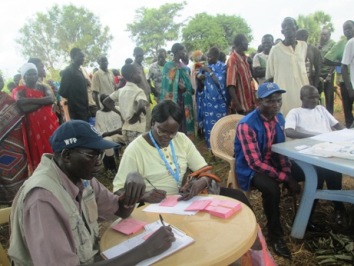South Sudan gov’t rejects relocation of IDPs to rebel-held areas
May 10, 2015 (JUBA) – South Sudanese government has rejected a plan by the United Nations (UN) to relocate over 100,000 internally displaced persons (IDPs) from various civilian protection sites to their places of choice, including villages and towns in the rebel-held areas in the country.

The cabinet official was reacting to the proposal of the UN Secretary General, Ban Ki-moon, who expressed grave concern about the plights of the IDPs, saying they expressed readiness to be relocated to their areas of choice instead of continuing to live in the government controlled towns of Juba, Malakal, Wau, Bor and Bentiu.
He said the government had been encouraging the IDPs to leave the camps, adding majority have already returned to their houses as normal citizens in the government held towns.
“Those who have returned are indeed comfortable. So we don’t understand the purpose of this proposal again,” he claimed.
But the UN Secretary General said Akobo and Old Fangak in Jonglei state as well as Leer in Unity state and Pagak in Upper Nile state, which are some of the rebel-held territories in the country have been identified as areas preferred by the IDPs for relocation.
Ki-Moon, however, in his latest report to the UN Security Council on the ongoing conflict in South Sudan, did not give the specific date on which the relocation plan would commence.
Officials of the armed opposition faction of the Sudan Peoples’ Liberation Movement (SPLM-IO) led by former vice president, Riek Machar, has already welcomed the proposal of the United Nations, describing it as “a right step in the right direction.”
“The SPLM leadership welcomes this proposal. It is a right step in the right direction. This is what the leadership has been saying,” Ayii Ayii Akol, deputy head of humanitarian affairs committee in the rebel group told Sudan Tribune on Sunday.
“We have been saying that the source of these people staying in the camps is because they have lost trust in the government and said it would be wise to allow them make their own choice and decision about where they would like to be taken,” he added.
Akol said his humanitarian wing of the movement will work hand in hand with the humanitarian organisations in areas under their control to ensure that IDPs are assisted to settle in their areas of choice, urging for the proposal to be implemented before rainy season.
Statistics of the IDPs with the United Nations Mission in South Sudan (UNMISS) showed that Malakal, capital of the oil-rich Upper Nile state, hosts about 21,000 IDPs, most of whom have witnessed disappearances along UN employees from the Nuer ethnic group within the last 17 months of the conflict in the country.
Media reports have charged pro-government troops and intelligence services as well as allied militia forces of kidnapping members of the IDPs from the camps. Others were kidnapped at the airport while boarding flights to other parts of the country.
Several others were indiscriminately killed in alleged crossfire between rival forces fighting to take and/or retain control of some strategic towns which have exchanged hands several times, mainly in Upper Nile region.
Similar killings also took place in Mapel town, Western Bahr el Ghazal state in 2014, when local population attacked recruits of the army from the ethnic Nuer who were undergoing military training there.
Hundreds of the IDPs were murdered in Jonglei state’s capital, Bor, in which two UN peacekeepers were killed along with many others, mostly children and women, by government allied troops.
(ST)
